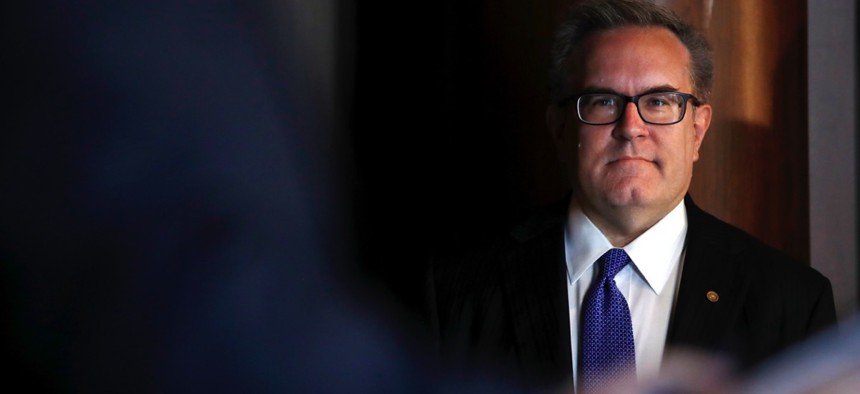California Isn’t Expecting Policy Changes Under the New EPA Head

Environmental Protection Agency Acting Administrator Andrew Wheeler Jacquelyn Martin / AP Photo
The court battle over the state’s strong fuel economy standards is still on.
WASHINGTON — Energy experts aren’t expecting policy changes under the Environmental Protection Agency’s new administrator, Andrew Wheeler, but do see more professionalism and practicality.
Wheeler reached out to the California Air Resources Board following his replacement of scandal-plagued Scott Pruitt in early July. He indicated “a more open discussion” of the state’s fuel economy standards, which are tougher than the federal standard, said Mary Nichols, CARB chair, on Tuesday at the POLITICO Pro Summit in D.C.
But California Attorney General Xavier Becerra is already in court challenging the EPA’s finding that the Obama-era Corporate Average Fuel Economy, or CAFE, standards are unattainable.
“I am not at the moment expecting any changes in direction—changes in policy,” Nichols said.
Coal tycoon Bob Murray, CEO of Murray Energy Corporation, used Wheeler as his attorney for two decades and echoed Nichols’ belief EPA policy would remain consistent. Murray said Wheeler preferred being the No. 2 at EPA but would make an “outstanding administrator” because “he cares about the environment.” (In an aside, Murray also noted that Wheeler can be trusted, as he “cares a lot about his mother.")
California holds a Clean Air Act waiver allowing it to set its own fuel economy standards, which—at 50 miles per gallon by 2025—are stricter than national targets. Thirteen other states have chosen to comply with California’s standards, in effect forcing automakers to build to those specifications because they comprise nearly half the car market.
The state is also among those in conversations with Canada, Mexico and other countries to continue upholding the Paris Agreement on climate, despite President Trump’s stated plans to withdraw from the international emissions accord.
“U.S. leadership is missing, and it’s wanted,” Nichols said. “But California and other states are stepping in to fill the leadership gap.”
Cleantech and fossil fuel industry goals alike are threatened by current trade conflicts the Trump administration has with China, Mexico, Canada and Europe—leaving U.S. energy exports in limbo, said Amy Myers Jaffe, director of the Council on Foreign Relations’ Energy Security and Climate Change program.
The U.S. has a “narrow window” in which to make headway in Qatari natural gas contract renegotiations, set to fall between 2020 and 2022, before trade conflicts mar them irreparably, Myers Jaffe said. The same is true for Mexico renegotiations.
“If Mexico’s economy isn’t doing as well … that could be very difficult for the president’s agenda for energy dominance,” she added.
Murray said the coal industry is impervious to trade discussions because of poorer countries’ reliance on U.S. exports to keep the lights on, arguing “there’s been no effect.”
That coal’s share of the U.S. energy market continues to decline almost two years into the Trump administration is the result of eight years of Obama administration “anti-coal” policies and electric utility companies wanting to be “politically correct” at the expense of ratepayers, Murray continued.
“We don’t have a climate change problem,” ha said. “What we have is an energy poverty problem in the world.”
Murray pointed out California’s electric rates are 40 percent higher than the national average, and Nichols admitted that’s true on a kilowatt-per-hour basis. But electric bills in California remain among the lowest in the U.S. because of state and local government investments in energy efficiency, she said.
Renewable energy is also more easily and cheaply distributed to remote areas than that from giant thermal coal plants and natural gas piping projects, Myers Jaffe said.
Murray has been a staunch advocate of Energy Secretary Rick Perry using emergency powers to save at-risk coal plants, but Perry has been more concerned with securing the U.S. energy grid from cyber attacks.
“There are foreign countries that have cookies and penetrations into our entire energy infrastructure,” Myers Jaffe said. “It’s really about protecting our national grid for which we all rely on.”
Dave Nyczepir is a News Editor at Government Executive’s Route Fifty and is based in Washington, D.C.
NEXT STORY: Summer Food Programs Face Challenges in Rural Areas






